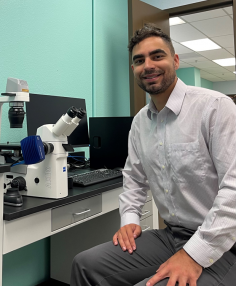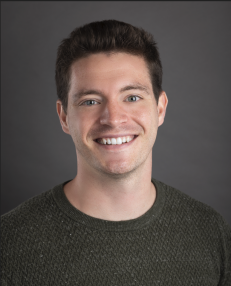Principal Investigator
 |
Sahar BakhshianSahar Bakhshian is a Research Assistant Professor at the Bureau of Economic Geology, Jackson School of Geosciences, The University of Texas at Austin. Her primary research concerns analytical and computational modeling of multi-physics problems as well as applying data science to leverage problems in energy and environmental context, with a focus on geologic carbon storage. Her work also involves leveraging physics-based pore- and macro-scale multiphase flow simulations and data-driven algorithms and tools for the characterization of CO2 footprint and leakage risk assessment during the geological storage of CO2. Sahar holds a Ph.D. in chemical engineering from the University of Southern California. |
Students and Staff
 |
Richard LarsonRichard’s research is centered around multiphase flow simulations and microfluidic experiments to study the effect of pore-scale properties (e.g., microstructural heterogeneity, wettability) on the characteristics of CO2 displacement and entrapment in heterogenous porous media. He possesses experience in data analytics, reservoir characterization for geologic carbon storage, drilling and completion operations of production sites in the Permian Basin and Marcellus Shale. His goal is to apply these skills to address intricate subsurface challenges.
|
 |
Ali FarhadiniaAli’s research focuses on modeling CO2 and brine leakage into drinking water resources to quantify potential impacts of leakage regarding groundwater quality. Dr. Farhadinia is a Reservoir Simulation Engineer with several years of experience in the petroleum industry. Ali has worked in research and development, enhanced oil recovery (EOR), reservoir evaluation and development, CO2 sequestration/EOR, as well as naturally and hydraulic fractured reservoirs. In 2008, Ali graduated with a PhD in Petroleum and Geosystems Engineering from UT Austin. Following 3 years of postdoctoral research, Ali worked with BP for 5 years, and has worked as a consultant for the last several years in a variety of modeling and simulation of complex reservoir engineering problems. |
 |
Chris DeranianChris’s research focuses on injectivity risk assessment associated with CO2 storage. He is a master’s student in the Energy and Earth Resources program studying CCS economics and carbon injection strategies. Prior to attending UT, he served for three years as an energy consultant and analyst in Colorado, working with utilities, energy commissions and private entities on energy systems transformation. In addition to his research and coursework, he is a student associate at the Austin Technology Incubator. In his spare time he enjoys backpacking, cooking and scuba diving. |
 |
Shaunak PandeyShaunak is a senior at Vandegrift High School. His research focuses on employing multiphase flow simulations to investigate how pore-scale properties influence the dynamics of CO2 displacement in fractures. He aims to utilize these skills to tackle complex subsurface issues. |
Past Members
- Zahra Bajalan, Civil Enginering, UT Austin
- Blazej Ksiazek, Petroleum Engineering, UT Austin
- Refaat Hashish, Currently at ExxonMobil
- Noah Binford, Bureau of Economic Geology, UT Austin
- Dong Feng, PostDoc, China University of Petroleum, Beijing, China
- Margaret Murakami, University of Helsinki
- Baole Wen, University of Michigan

